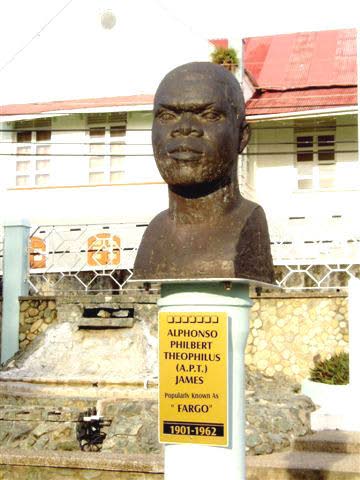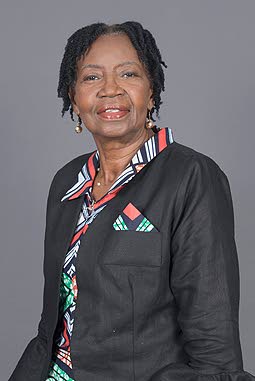Fargo's commanding presence in Trinidad and Tobago

DR RITA PEMBERTON
The acute national interest in the much-needed and long-awaited new vessels to service the inter-island route was fired by the expectation that, once operational, the new vessels would bring an end to the escalating litany of lamentations of the Tobago business community.
The arrival of the first ship, the APT James, named after the Tobago icon, attracted considerable crowds when the vessel arrived in Tobago before proceeding to Trinidad in accordance with the quarantine protocols.
It is very surprising that so many in the country know so little about APT, who lived and worked in both islands. This lack of knowledge is revealed in the most frequently asked question: “Who is he?” and many confessed that they had never heard of him.
What is particularly disturbing is that, despite the establishment of James Park in Scarborough, in his honour, Tobagonians number among the uninformed about the man and his contribution to the island. This reflects a serious deficiency in our education system which underscores the need for educational reform.
Popularly known as Fargo, APT James migrated to Trinidad, made his home in Point Fortin and obtained employment in the oil industry. He began at the lowest job levels in the industry but quickly moved up the ranks serving as supervisor, foreman and ultimately contractor with his own teams of employees.
Having made his fortune he returned to Tobago where he sought to stimulate a developmental thrust on the island. While he is regarded as an iconic figure in Tobago, it must be indicated that he also made a sterling contribution to Trinidad, particularly the southern areas such as Point Fortin and La Brea. Through the various services he provided, he made a significant contribution to the development of the oil industry and most importantly to the oil field workers. One former employee described Fargo as “a big man,” which reflects the varied nature of his presence on the islands. Fargo was “big” in four different ways:
Fargo was big in stature. Because his size and strength were perceived similar to the big, American heavy-duty truck, it is believed by some that he got his nickname after the truck.
However, his close family disputes this explanation and asserts that the nickname was acquired out of an incident on the job, when he instructed a group of his employees to remove a pile of poles from the work site and went off to attend to other matters. The men huffed and puffed but concludwd that the task was beyond them, and the poles were not moved.
When Fargo returned, the poles were still lying on the ground and the men complained that they were unable to move them because they were too heavy. James steupsed, picked up the pile of poles and removed them himself. He was labelled Fargo, which was stamped at the end of each pole, which became his nickname.
Secondly, Fargo was considered a “big man” because he moved in "big” circles. He was constantly engaged with Arthur Andrew Cipriani, Tubal Uriah "Buzz" Butler and other leading trade-union figures to organise the workers and deal with the issues with which they faced. Because of his intercessions on behalf of the workers he assumed positions in the trade-union movement: as branch secretary in the Trinidad Workingmen’s Association in La Brea and president of a branch of the Federated Workers Trade Union. In his efforts to get the best deals for the workers he represented, he constantly communicated with employers and managers of the various business operations in the oil industry,
Thirdly, to the workers, Fargo, who was highly respected by all, loomed large. He was the “big man” to whom they had access. They had faith in his ability to seek their best interests and were confident that he would always intervene on their behalf when necessary. He was approachable and caring and was always helpful and generous. In the words of one former worker, “he activated the law of giving” as he tried to ensure no one was left in need, and his workers considered it a privilege to work for him.
As he did in Tobago, Fargo assisted people to obtain jobs and land, build homes, pay school fees and feed their families, so helping a number of people to improve their station in life.
Fourthly, James was a big businessman. He became a contractor who employed several teams of workers to provide services to the different companies with which he held contractual agreements. One such contract, which provides an insight into the magnitude of his operations, was for loading bitumen on the ships.
One former employee recalls that Fargo’s workers were organised into teams. He worked with 150 men who were required to provide the infrastructure for shipping bitumen. This involved a process which was called “laying dunnage,” to accommodate the drums in which the bitumen was shipped. The drums were layered on the ship upwards from the floor and strips of wood were placed at the top of each row, to accommodate the next row of drums. The labourers were transported on small boats to work on the big ships which were anchored in the Channel.
His business was well organised with different levels of administrators, supervisors and foremen to manage all the operations of both his land- and sea-based business activity. There is no doubt that Fargo was an imposing figure on the landscape of south Trinidad.
Where Tobago is concerned, it has been recognised that Fargo’s ideas for the development of Tobago continue to be of relevance today and as a consequence, they remain central features of present-day development plans for the island. These include: the interisland ferry service; improved hospital and health care facilities; water and electricity supply; the provision of education facilities; the development of tourism and agro- and fishing industries; increased representation and the very elusive autonomy drive.
Fargo James established a commanding presence in Trinidad and Tobago and his enduring legacy remains indelibly etched on the nation.



Comments
"Fargo’s commanding presence in Trinidad and Tobago"